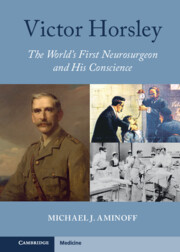Book contents
- Victor Horsley
- Victor Horsley
- Copyright page
- Dedication
- Contents
- Preface
- Acknowledgments
- Chapter 1 Early Days
- Chapter 2 The Other Side of Gower Street
- Chapter 3 At the Brown
- Chapter 4 Dividing the Indivisible: The Localization of Cortical Functions
- Chapter 5 The Making of a Specialty
- Chapter 6 The Grammar of Neurosurgery: Technical Underpinnings
- Chapter 7 The Neurosurgery of Specific Disorders
- Chapter 8 Measures of the Man
- Chapter 9 The Politics of Protection
- Chapter 10 Not So Trivial Pursuits: The Slide into Politics
- Chapter 11 Antivivisectionist Claims and Clamor
- Chapter 12 Bitter Tears: Horsley and the Suffragist Movement
- Chapter 13 Last Orders: The Temperance Movement
- Chapter 14 Syphilis and the Public Health
- Chapter 15 A Surgeon Goes to War
- Chapter 16 Aftermaths and Appraisals
- Book part
- Index
- References
Chapter 9 - The Politics of Protection
Published online by Cambridge University Press: 06 January 2022
- Victor Horsley
- Victor Horsley
- Copyright page
- Dedication
- Contents
- Preface
- Acknowledgments
- Chapter 1 Early Days
- Chapter 2 The Other Side of Gower Street
- Chapter 3 At the Brown
- Chapter 4 Dividing the Indivisible: The Localization of Cortical Functions
- Chapter 5 The Making of a Specialty
- Chapter 6 The Grammar of Neurosurgery: Technical Underpinnings
- Chapter 7 The Neurosurgery of Specific Disorders
- Chapter 8 Measures of the Man
- Chapter 9 The Politics of Protection
- Chapter 10 Not So Trivial Pursuits: The Slide into Politics
- Chapter 11 Antivivisectionist Claims and Clamor
- Chapter 12 Bitter Tears: Horsley and the Suffragist Movement
- Chapter 13 Last Orders: The Temperance Movement
- Chapter 14 Syphilis and the Public Health
- Chapter 15 A Surgeon Goes to War
- Chapter 16 Aftermaths and Appraisals
- Book part
- Index
- References
Summary
Horsley was not one to win friends with an easy smile, gentle asides, and whispered confidences, and he certainly did not always bother with subtleties or even genteel niceties in expressing his views. Some have wondered what drove an outspoken and confrontational man like Horsley into the “muddy pool of politics.”1 He became involved early in a number of social issues in which he had a personal stake, such as opposing the clamor and charges of the antivivisectionists and speaking in support of the temperance movement, as discussed in other chapters. The challenges, verbal sparring, and camaraderie were to his liking and he gained increasing national prominence by his stands. This led him to become more engaged in the cut and thrust of medical and then national politics, enjoying the support of many of his contemporaries in doing so. It was as if he needed something with which to challenge himself, something to fight about. The experience of having to deal with his son’s epilepsy and his own failure to cure it by surgery may well have caused Horsley to turn further from clinical work and become even more immersed in social and political activities.2
- Type
- Chapter
- Information
- Victor HorsleyThe World's First Neurosurgeon and His Conscience, pp. 105 - 116Publisher: Cambridge University PressPrint publication year: 2022



